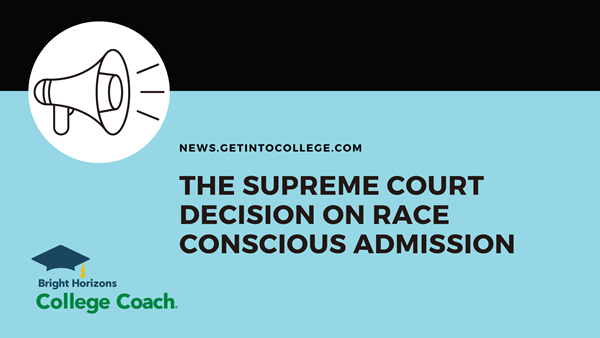The Supreme Court Decision on Race Conscious Admission
Last month, the U.S. Supreme Court ruled that colleges and universities, with the exception of military academies, can no longer practice race-conscious admission. Exactly how the admission process will change will be revealed in the coming months and even years, but this is what we know now.
- Colleges will abide by the court’s decision and are in the process of ensuring their individual practices are in compliance starting with the upcoming 2023-2024 admission cycle.
- Colleges are releasing statements in support of diversity and are rethinking admission practices. Prior to the decision, nine states* had already prohibited race-conscious admission and some had changed their admission process in significant ways to account for other factors that can increase diversity. For example, Texas law offers automatic admission to its public colleges and universities to the top 10% of freshmen applicants from in-state high schools (top 6% for UT Austin). Other colleges, like Caltech, have adopted test-free policies, and many are adding new recruitment strategies. Even with new policies, admission offices worry that diversity will decrease on their campuses, an outcome the University of California experienced when voters approved a state-wide ban on race-conscious admission at public universities in 1996.
- The Common Application, the admissions app platform used by many colleges and universities, is permitting colleges to suppress student responses to the optional question about race and ethnicity. This will prevent admission offices from viewing a student’s answer to that question during application review.
- Colleges may choose to change their supplemental essay prompts. Any new prompts will likely be visible on August 1, when the Common Application rolls over to the upcoming 2023-2024 admissions cycle.
- Students may choose to discuss their race in application essays. As the majority decision states, “though nothing in this opinion should be construed as prohibiting universities from considering an applicant's discussion of how race affected his or her life, be it through discrimination, inspiration, or otherwise.” In other words, while race can’t be used as a factor in admissions decisions, students are not prohibited from discussing on the applications how race may have impacted their lives, and admission officers are able to view these discussions through the lens of values such as “courage,” “leadership,” “unique ability,” and, “determination.”
- The most selective schools will still be increasingly selective. While some may expect the end of race-conscious admissions to increase the likelihood of being accepted at their college of choice, this won’t be the case, as the most competitive schools typically accept less than 10% of applicants.





